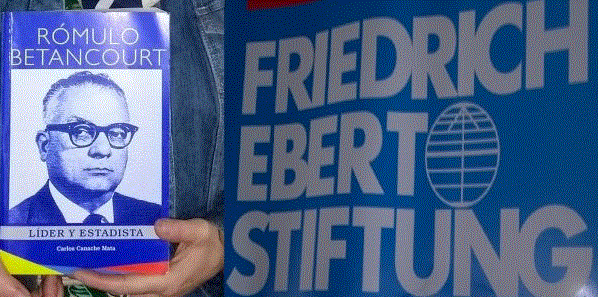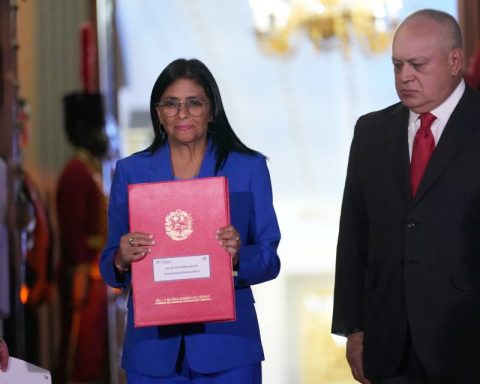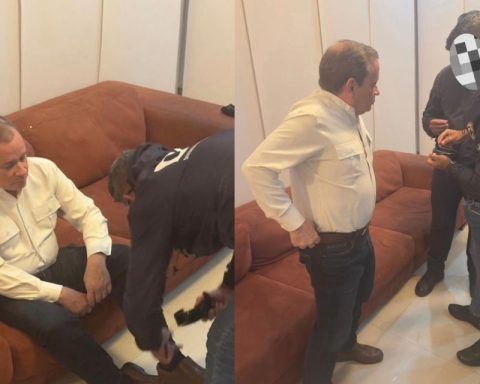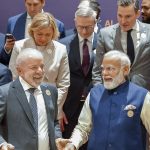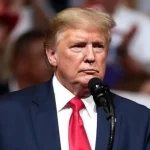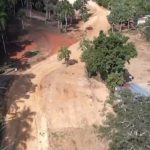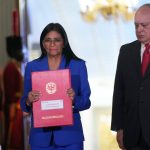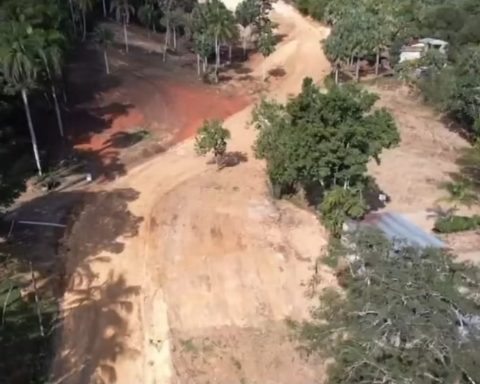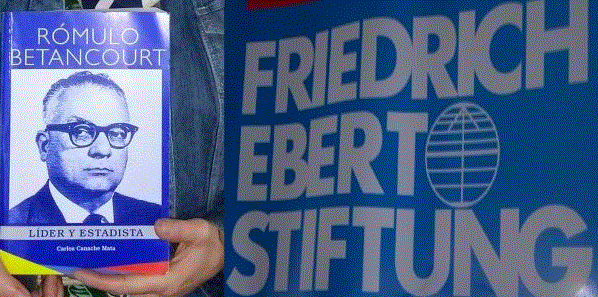
Rómulo Betancourt, leader and statesman is the title of the political biography of the founding leader of Acción Democrática that Carlos Canache Mata has just published. The work was presented to a large audience on April 27 at the Covered Plaza of the Rector’s Office of the Central University of Venezuela. This space of freedom, under the mantle of its architectural beauty, offered a propitious environment to remember historical events associated with the birth of democracy.
The event was sponsored by the Friedrich Ebert Stiftung Foundation, whose director, Katharina Wegner, opened the presentation of the work and was followed by Marialbert Barrios, member of the Fermín Toro Foundation; by Virginia Betancourt Valverde, for who signs this article and by Carlos Canache Mata. The event was moderated by the professor and former parliamentarian Pedro Pablo Alcántara. In this article I will recall some of the reflections that I presented that day.
There are several quality biographies and essays on Rómulo Betancourt. The books by Germán Carrera Damas, Manuel Caballero, Robert J Alexander and Arturo Sosa Abascal about the adeco statesman now find company with this valuable work by Carlos Canache Mata. This list is extended by the studies and essays on Betancourt’s thought, collected in the book Rómulo Betancourt: History and contemporaneity published by the Rómulo Betancourt Foundation. To this string must be added The Betancourt Doctrine, an alternative for Venezuela by Luis Jose Oropeza.
Betancourt begins his political and intellectual activity from the generation of 28, called by José Rafael Pocaterra as the “predestined generation”. Throughout the book, the author points out the facts and also exposes his analysis and points of view on the political and intellectual life of Betancourt, from his fight against gomecismo to the consolidation of democracy. One of the merits, among others, of this work is that the author witnessed many of the narrated events. Hence the book contains a biography and, to some extent, memoirs.
Juan Vicente Gómez, Eleazar López Contreras, Marcos Pérez Jiménez and Rómulo Betancourt occupy an important place in the Venezuelan 20th century, each with their position and significance. Gómez and Pérez Jiménez represent the dictatorship; López Contreras is the balanced and intelligent man who opens the doors to transition and freedom; Betancourt is the statesman of democracy and of the construction of the most important political party in our contemporary history.
Rómulo Betancourt offered to govern his entire period: not one day more nor one day less. He did so, despite the uprisings and attacks suffered by his government. Hence, some believed that it would be a short government, but his political intelligence allowed him to overcome the obstacles until he handed over the government to Raúl Leoni. After November 24, 1948, the adeco leader had developed a keen nose for sniffing out conspiracies. And this allowed him to warn them in advance.
It is good to remember that after January 23 there was a need to nurture unity in order to give democracy a base of support. For this reason, Rómulo Betancourt, Rafael Caldera and Jóvito Villalba signed in the fifth Puntofijo, residence of the second of those named, the governability agreement that revolved around three ideas: “Defense of constitutionality according to the electoral result”; “b) Government of National Unity” and “c) “Common Minimum Program”. These three objectives were respected without hesitation. In this way an alliance was achieved that gave support to the nascent democracy. Respect for the electoral results was decisive in the agreement reached. Political parties understood the importance of unity in order to defend the political system from military threats. They also understood the significance of the principle of alternation in power.
Betancourt was besieged by attempted coups. The first was that of Castro León, on April 20, 1960 in San Cristóbal; then the coups in Carúpano (5.4.1962) and Puerto Cabello (6.2.1962) organized by the Communist Party. To this is added the attack launched by Trujillo from the Dominican Republic, in June 1960, shortly after the right-wing uprising of Castro León. However, the vigorous leader of democracy emerged victorious. A short time later, on June 26, 1961, the attempt known as “Barcelonazo” took place, led by soldiers of Perezjimenista lineage. In this uprising, Carlos Canache Mata was the secretary general of the government (see Chapter 50, pp. 431-439), and the governor was Rafael Solórzano Bruce. Both, governor and secretary of government, risked their lives in defense of constitutionality.
In this context, Fidel Castro reappears, after his visit to Venezuela in January 1959. Betancourt’s political intuition allowed him to see what the Caribbean revolutionary meant by refusing to hold elections on the island. The Cuban Revolution had come to stay, and voting was not in his plans, unless they could make it up once Castro was consolidated in power. Castro’s aggressiveness was overwhelmed. The interference was permanent, to the point of carrying out two invasions. That of Macama, in 1963, a Falconian beach, where weapons and supplies were deposited to sabotage the election of Raúl Leoni. Then came the invasion of Machurucuto (Miranda) in May 1967. As a curious fact, we must remember that General Arnaldo Ochoa, hero of the Angolan war, was arrested here and later shot by Castro. However, Presidents Adecos, Betancourt and Leoni defeated Fidel Castro with the unconditional support of the Armed Forces, which demonstrated his rejection of Castro’s invasions and his commitment to democracy.
All the obstacles were overcome under the leadership of Rómulo Betancourt and the responsibility of the political class that promoted a unitary agreement, such as the aforementioned Puntofijo Pact. Without unity and a long-range vision, there is no possibility of developing democracy.
After defeating the urban guerrilla Betancourt, he stated in his characteristic language: “We have defeated the sycophants of the underworld.” (These expressions and phrases of the adeco leader are perhaps the product of his readings of the works of Miguel de Cervantes and José Rafael Pocaterra). In this way, Betancourt was able to fulfill his promise that he would not govern one day more or one day less than that stipulated by the Constitution. In this way, he handed over the government to Raul Leoni, another adeco statesman, in an image that projects the consolidation of a political system, thanks to the vision and responsibility of its leaders.
Among the examples of Betancourt it is necessary to highlight his probity. The exercise of politics and government under unconditional respect for ethical rules. This is also a feature that has characterized the political life of Carlos Canache Mata. And this virtue -probity- I highlighted in the act of the UCV to point out similarities between the founder of AD and the author of this new biography, who is one of its most outstanding historical leaders of the People’s Party. In this sense, Carlos Canache Mata affirmed: “I am a man of very clear and defined positions. I have a militant position against corruption. I don’t have a glass ceiling or straw tail, as the whole country recognizes, including my opponents. I can speak without fear of any kind because there is no possibility that they will blackmail me at any time” (The National: Forum with Alfredo Peña, 8.10.1989).
Then, on July 17, 2019, at the event in his honor organized by the Association of Retired Parliamentarians, he proclaimed: “My poverty is my greatest wealth.” This phrase says what Canache Mata is: a politician who has made probity a rule of life. This is inherent in a select group of politicians of the civil era, who did not take advantage of the positions they held or the power they held to enrich themselves or favor friends and family.
For political action to yield results, politicians characterized by probity, decency, intellectual contribution, doctrinal discussion and commitment to Venezuela are required.
In understanding the political history of a country, the biographies and memoirs of its great actors constitute relevant contributions. It’s what happens with Rómulo Betancourt, leader and statesman, by Carlos Canache Mata.
